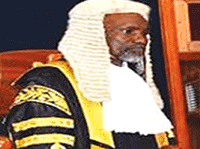Penultimate Thursday, JUSUN NEC issued a communiqué that its members nationwide will resume their suspended strike if, after seven days, the technical committee set up by the government fails to implement the court judgment which upheld their demand for financial autonomy. Senior Correspondent, JUDE KENNETH, x-rays the issue at stake and the effect of the strike.
The newly-appointed Chief Justice of Nigeria (CJN), Mahmud Mohammed, may have his first bullet of challenge in resolving the knotty issue of financial autonomy to the nation’s judiciary at both the federal and state levels, if after seven days ultimatum, the demands of the Judiciary Staff Union of Nigeria (JUSUN) are not met.
In the same vein, litigants, detainees and prisoners will have their hopes thwarted, if by December 1, 2014, JUSUN resumes its suspended strike.
The union is specifically demanding the implementation of the judgment delivered by an Abuja High Court for financial autonomy to be granted the third arm of the government – the judiciary.
Justice Adeniyi Ademola of the Federal High Court, Abuja, had on January 13, 2014 restrained the federal government and the 36 states of the federation from holding onto the funds meant for the judiciary, only to be disbursing the funds in bits as it pleases the executives.
Delivering judgment on the suit filed by JUSUN, Justice Ademola held that “the practice of the executive by directly disbursing funds to the judiciary was unconstitutional and also threatened the independence of the judiciary”.
Therefore, he ordered: “The Attorney-General of the Federation (AGF) and the states should act responsibly and promptly to avoid constitutional crisis in this country by ensuring financial autonomy for the judiciary.”
Speaking on why the union wants to resume the strike which was only suspended last September, Chairman of JUSUN, Lagos State, Emmanuel Abioye, made reference to Sections 121(3) and 162 of the 1999 Constitution, which grant financial autonomy to the judiciary. He said that the judgment delivered on the issue by a Federal High Court in Abuja on January 13, 2014, upheld that the financial autonomy of the judiciary is constitutional and non-negotiable. The method of disbursing money is cumbersome, uncontrollable and non-procedural.
According to Abioye, copies of the judgment were sent to the AGF, states attorneys-general, Minister of Finance, National Judicial Council (NJC), state governors, Auditor-General of the Federation and key stakeholders in the judiciary, adding that none of the aforementioned stakeholders filed any appeal against the judgment.
“We expect that the judgment will be implemented, but till now, no positive response. The government promised during our last suspended strike that it will set up a technical committee to look into our demand; but till now, it has not come up with the implementation of the judgment.
“The judiciary, being the hope of the common man, should be granted the financial autonomy to enable it perform its role for the common man,” Abioye said, expressing that democracy is premised on the rule of law.
He recalled that JUSUN had embarked on nationwide strike last July, but only suspended it in September following the setting up of the technical committee by the government to look into the demands of union.
However, having waited and discovered that nothing was forthcoming from the technical committee, the National Executive Council (NEC) of JUSUN held an emergency meeting on November 20 at the Labour House, Abuja, to review the situation. At the end of the meeting, the council issued a communique, giving the executive arm of the government ultimatum to comply with the judgment, failing which its members nationwide would resume the suspended strike on December 1, 2014.
In the communique dated Thursday, November 20, 2014, and signed by Marwan Mustapha (president) and Isaiah Adetola (secretary), the NEC-in-Session condemned the unwarranted delay in the implementation of the judgment delivered on January 13, 2014. While appreciating the leadership role displayed by the immediate past CJN, Mariam Aloma-Mukhtar, while in office, the council congratulated the newly-appointed CJN, believing that he would keep the flag of Nigeria’s judiciary flying.
According to the communique, NEC-in-Session also appreciated the supervising Minister of Labour and Productivity as well as Minister of State for Finance for their efforts at ensuring financial autonomy for the judiciary in Nigeria.
However, the council felt disappointed that the technical committee has not come up with positive result aimed at implementing the court judgment which nobody has appealed against. In view of the above, the council resolved to grant the seven days requested by the stakeholders to conclude and begin implementation of the said judgment, adding that granting of seven days as requested by the stakeholders is a mark of respect for the new CJN. At the expiration of the seven days grace, there would be no further extension of time, he stressed.
The council frowned seriously at the continuous delay in the release of the federal judiciary allocations, demanding that such act must stop immediately. Consequently, it resolved and ordered all judiciary staff nationwide to resume the suspended strike action on Monday December 1, 2014 if the technical committee eventually fails.
Effect of the strike
The impending strike will, no doubt, paralyse activities and proceedings at both the federal and state high courts.
Abioye agreed that the strike, if commenced, will affect the public negatively, especially litigants, the awaiting-trials, prisoners, payment of court charges, swearing of affidavits and a lot more, but said that the effect was considered while giving the ultimatum. He hoped that before the expiration of the time, issues would be resolved to avert the strike.
“Why we are giving seven days’ notice is for government to respond positively and for well-meaning Nigerians to appeal to government to obey the judgment, so that the judiciary can be truly independent.
“We do not want that allegation that the judiciary is being influenced by the executive arm of the government,” Abioye said.
Administratively, the strike, if commenced, will affect administrative work such as documentation and filing of court processes, filing of new suits, swearing of affidavits, payments and other duties outside litigation. It will also affect and delay the preparation and delivery of quarterly returns of judgments and rulings to Abuja.
Suspects, who are remanded in prison custody pending the hearing and determination of their bail applications, will be adversely affected, as they will remain confined until the strike is called off.
Reactions
Commenting on the impending strike, Lagos lawyer and human rights activist, Ebun Adegboruwa, said he supports the strike because the union is making a legitimate demand, but the timing is wrong.
His words: “I know that their demand is about judiciary autonomy, independence of the court, and proper funding of judiciary. To that effect, their request is justified, moreso there is a judgment directing that judiciary funding should be applied as stated in Section 287 of the 1999 Constitution.”
He, however, said that the strike will have serious side effect on the public, as this is the time the courts will be hearing petitions and other applications. He maintained that the timing is wrong.
Another Lagos lawyer, Chidi Nwuke, said that strike is not the only way of resolving issues, positing that associations and unions have abused the issue of strike as a remedy. He added that strikes have really become meaningless because, at the end of it all, little or nothing would be achieved.
Speaking on the judiciary autonomy, Nwuke said the judiciary as the third arm of the government is to interpret law and not to award contract. The award of contract for the construction of structures in the judiciary is the duty of the Ministry of Works which is in the executive arm. He agreed that the judiciary should be well funded for settlement of emoluments and salaries, but should not be agitating for autonomy and seeing itself as running battle with the executive.
He explained that the fund being demanded by the judiciary, sometimes, “does not come in bulk but in trickles through internally-generated revenue (IGR) and budgetary allocation. At one time, there may be enough funds to distribute, but at some other time, the available funds may not be enough”.
“A lot of things need to be worked out. We have one government with three arms, and not three governments. The strike syndrome has really affected the system, and it is not always the best option,” Nwuke said.
On whether he supports the impending strike, Nwuke emphatically said: “I do not support the strike. The organic system is wrong. At the end of the day, the common man suffers. The timing is wrong.”
The Executive Director, Governance in Africa, Chijioke Kanu, threw his weight behind the union, saying that the union was in the right direction. He advised the union to channel their grievances to the National Assembly for necessary amendment in the 1999 Constitution.
“The constitution is very clear; there is procedure for amending it. The union needs to seek out their grievances with the National Assembly,” Kanu said.
Whatever may be the issue for refusing to implement the court judgment, parties involved in the impasse – JUSUN, the federal and state governments – should ensure that the issue in dispute is permanently resolved in the interest of the nation and justice.












